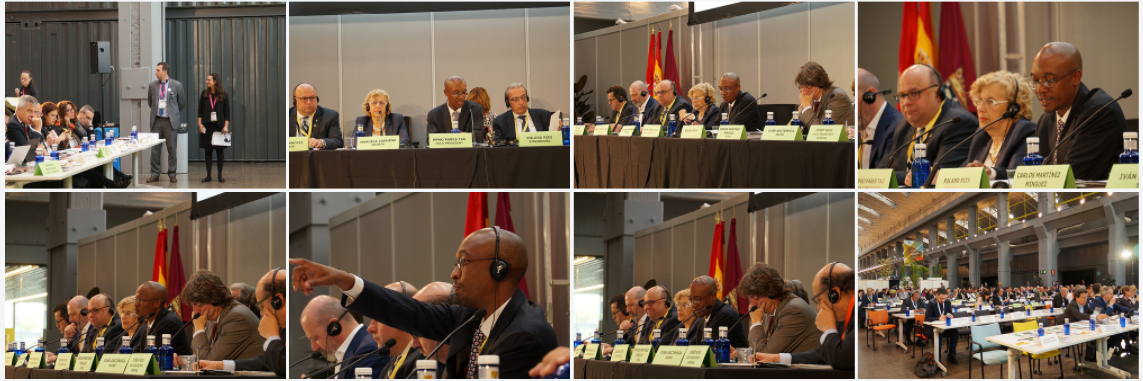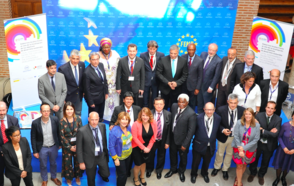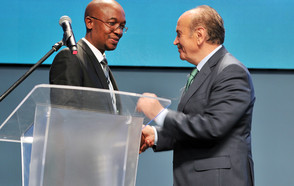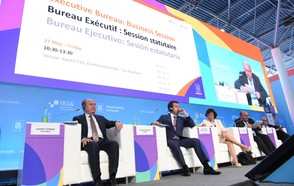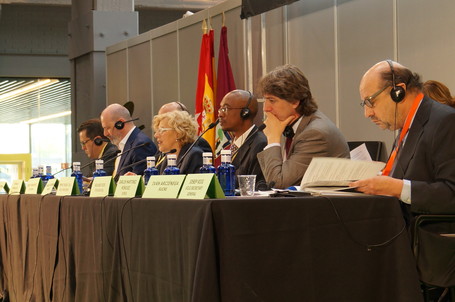
Cities and territories from across the world analyzed their strategic priorities for the implementation of the global agendas during the UCLG Executive Bureau
Our Executive Bureau met in Madrid on 19 April, back-to-back with the First World Forum on Urban Violence and Education for Coexistence and Peace. Representatives of cities and local and regional governments, along with important figures from the urban world, came together to draw attention to the important role that local governments play in solving the major challenges of our time.
The focus of the second day was the meeting of the Executive Bureau, which featured the exchange of local best practices and discussions on the priorities of UCLG members: ensuring a sustainable future for our cities, the path towards transparent governance, updates on the implementation of the New Urban Agenda just before the meeting of the UN-Habitat Governing Council, the follow-up and monitoring of the implementation of the SDGs, and climate and resilience agendas, among other strategic areas.
Our strategic priorities
The focus of this second day of our meetings was the session of the Executive Bureau, which featured the exchange of local best practices and discussions on the priorities of UCLG members: ensuring a sustainable future for our cities, the path towards transparent governance, updates on the implementation of the New Urban Agenda just before the meeting of the UN-Habitat Governing Council, the follow-up and monitoring of the implementation of the SDGs, and climate and resilience agendas, among other strategic areas.
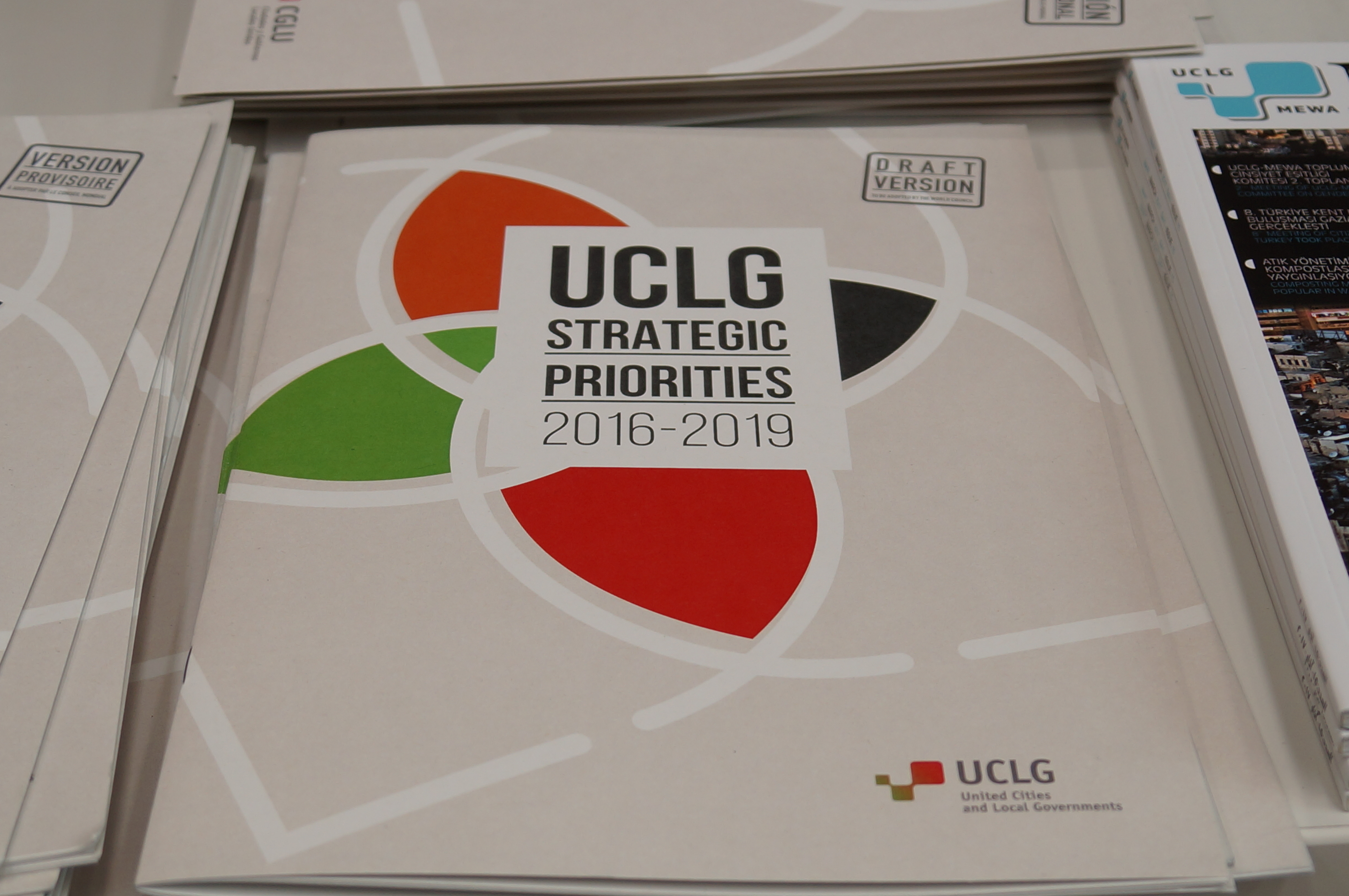
The Executive Bureau recommended a set of strategic priorities for UCLG for the period 2016-2022 to be adopted by the World Council. The strategic priorities aim to enable the network to implement the global goals through the application of the Bogotá Commitments, that is, to localize the 2030 agenda and implement the Habitat III agenda. The priorities cover five main dimensions: implementation of the goals on the ground; advocacy; monitoring and reporting; peer-learning and strengthening the UCLG network.
UCLG, as the global network of local and regional governments, needs to build on its strong political leadership to build momentum in the debate on good governance, placing local and regional government at the heart of a constantly-changing world. As the global network of local and regional governments, the capacity of UCLG to be the united voice and advocate of democratic self-government is determined both by its own institutional capacity and its strategy, said President Parks Tau opening of the Executive Bureau.
The design of, and communication flow between, our network must be the mechanism through which to ensure a bottom up, member-centric approach. Organizational consolidation and our capacity for renewal is therefore of critical importance to our unity and the impact of our work” added President Tau, recalling his electoral manifesto.
The Mayor of Madrid and host of the meetings, Manuela Carmena, thanked participants for having chosen her city to hold this statutory meeting of, in her words, “the most important network of cities”. Manuela Carmena added that “networks of cities are networks of the future”, and invited members to participate in the World Forum on Urban Violence and Education for Coexistence and Peace.
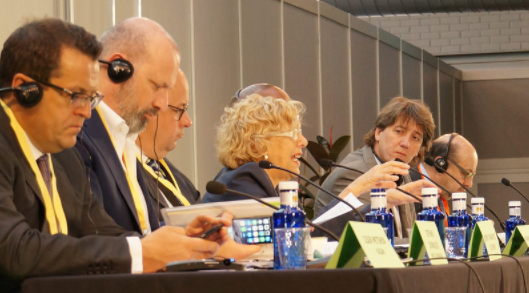
Vice-President of the European Section, Carlos Martínez Mínguez, Mayor of Soria, celebrated the hosting of the policy dialogues on SDG localization in the FEMP headquarters the previous day and highlighted the role that networks of local governments like UCLG have in influencing the international agendas with local experiences.
An extensive and synchronized global network: UCLG waves of action
“In a network like ours, synchronization is important as together we can achieve more” said UCLG Co-President and Mayor of Strasbourg Roland Ries, in reference to the UCLG waves of action.
Local financing, decent housing for all and migration were some of the themes selected by the Executive Bureau to synchronize the global network and launch our next waves of action.
Renewal of UCLG policy development and consultation mechanisms
The importance of UCLG's political leadership was emphasized once again with the approval of the Policy Councils, which will involve political leaders beyond the Presidency in key areas of our strategy.
The Executive Bureau agreed to set up the following Policy Councils, which will be chaired by elected officials.
- Right to the City and Inclusive Territories
- Opportunities for All, Culture and City Diplomacy, Key for Development and Peace
- Territorial and Multilevel Governance, and Sustainable Financing
- Safer, Resilient and Sustainable Cities, Capable of Facing Crises
UCLG Policy Statement on Development Effectiveness and Local and Regional Governments
The Executive Bureau adopted a Policy Statement on local and regional governments and effective development. This paper builds on the consultations and surveys carried out by the Capacity and Institution Building (CIB) Working Group, on local government associations’ involvement in the definition, implementation and monitoring of national development strategies.
The analysis of the responses and in-depth interviews enabled important case studies to be developed.
The Policy Statement will serve as an input to the work carried out for the Global Partnership for Sustainable Development, and will be used in advocacy activities by UCLG and its members in relation to the monitoring, follow-up and review of international agendas.
Strategic Partnership with the European Commission: 2018-2020
Since the signing of the Strategic Partnership with the European Commission in 2015, the EU has recognized the role that municipalities, cities and regions play in policy- and decision-making to face global challenges, as well as the implementation of shared global agendas at the local level.
The partnership with the European Commission has fostered dialogue among institutions and has enabled the positions of local and regional governments to become known within the European Commission and its official missions.
Local governments' contributions to global negotiations
In recent years, UCLG’s action has centred on advocacy and policy work. The Global Taskforce of Local and Regional Governments (GTF) has been a critical lever to bring together the major international networks of local and regional governments to strengthen our joint advocacy relating to the international policy processes.
The successful edition of the second World Assembly of Local and Regional Governments in Quito, as well as its recognition in the New Urban Agenda, were recalled by the Executive Bureau. In this regard, the Presidency urged members to contribute to the legitimacy of the Assembly by participating and supporting UCLG in its task of facilitating the GTF.
Group of Observers on local democracy
In view of the increasing situations in which the integrity of local government and representatives are undermined around the world, it was proposed to set up a group that would monitor and propose recommendations in relation to these cases.
President Parks Tau further recalled the incarceration of Mayor of Dakar, Khalifa Sall and of the Mayor of Diyarbakir, Gultan Kisanak, along with numerous other Kurdish mayors that are being detained. It called for statements of concern and for support to be continued.
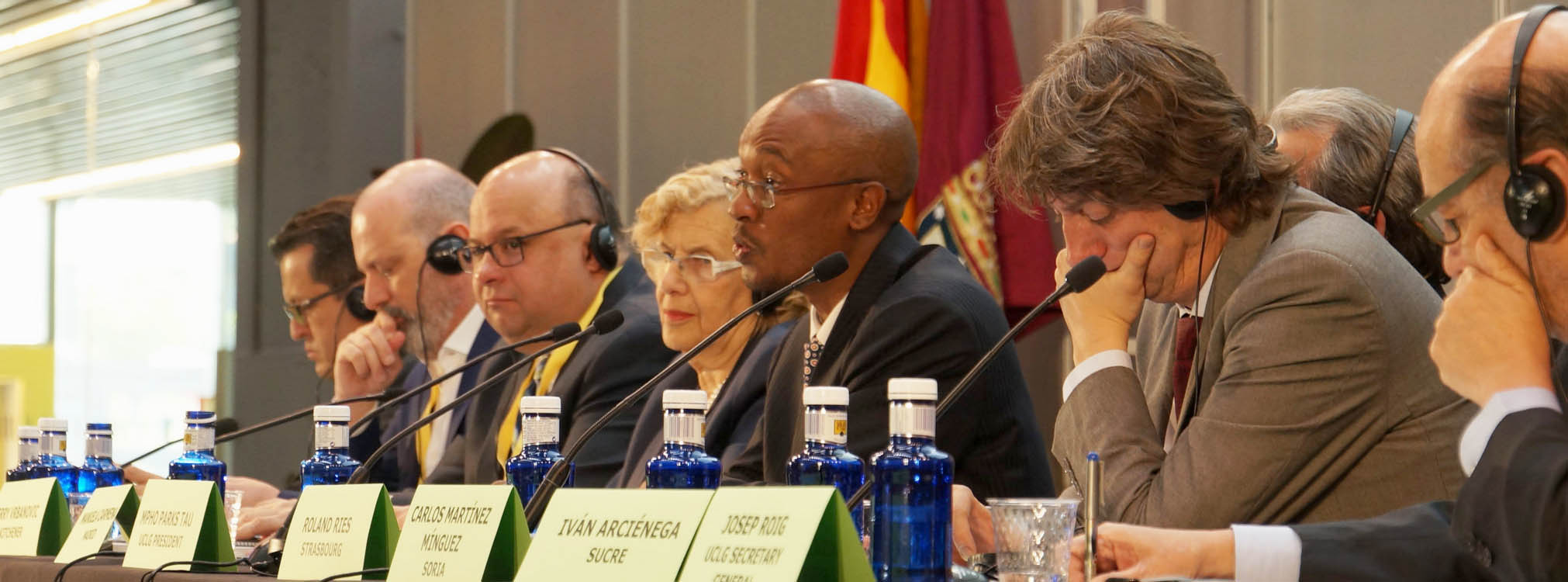
Recruitment process of the Secretary General
In view of the retirement of the current Secretary General this year, political representatives defined the process of recruitment that will take place in view of appointing the new Secretary General at the 2017 World Council.
Achievements of local and regional governments in the fields of peace, culture, and urban innovation policies
Connecting knowledge and ideas to cities and territories is key to UCLG’s learning strategy. The UCLG awards are part of this learning agenda. The UCLG’s global awards aim to highlight the achievements of local and regional governments in a range of fields, such as peace, culture and urban innovation.
The Second UCLG Culture Summit will take place from 10 to 13 May 2017 in the Province of Jeju (South Korea). The Summit will bring together cities, local governments, experts and leaders from around the world to discuss culture as a key pillar of sustainability.
See you soon in Hangzhou!
The next meetings of the Executive Bureau and World Council will take plave in Hangzhou at the end of 2017. The date, which will be some time in October or November, will be announced soon.
Cities for peace

The Executive Bureau thanked the Mayor of Madrid for hosting the UCLG meetings and for the effort made to provide a diverse space in Madrid to enrich the debate on Urban Violence and Education for Coexistence and Peace in cities and territories. Members expressed their enthusiasm for the Forum on Urban Violence, co-organized by UCLG, which runs until 21 April..

The Forum was conceived as a meeting point for local leaders, organizations and international networks, academic figures, NGDOs and civil society actors, aiming to open up a joint process of discussion, reflection and the construction of solutions that promote urban environments capable of eliminating expressions of violence.
The opening ceremony of the Forum, just after the meeting of the Executive Bureau, featured the two key mayors promoting this initiative: Anne Hidalgo, Mayor of Paris, and Manuela Carmena, Mayor of Madrid. Manuela Carmena called for “the 21st century to be the century of learning and coexistence” and highlighted how local authorities can teach how to resolve conflict and violence. Anne Hidalgo thanked the networks of local governments and the creation of forums such as these, through which experiences can be shared among counterparts. “Mayors are politicians that want to find concrete solutions” to fight against violence between cities and between societies2, she said.
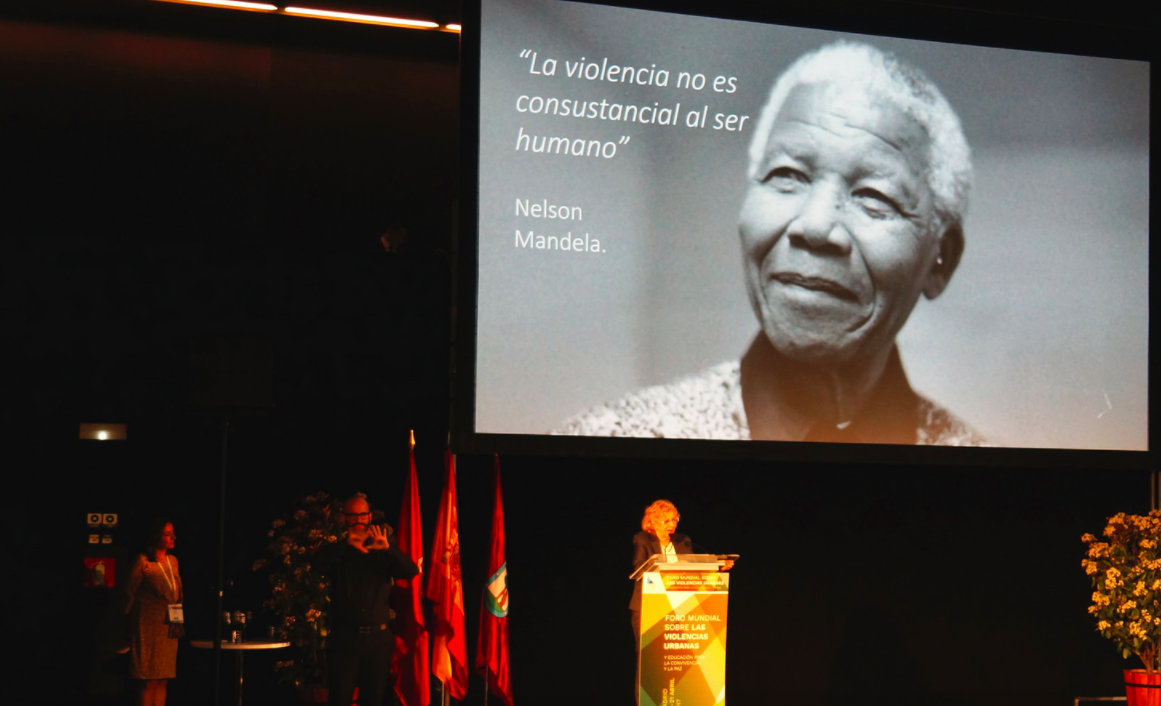
The forum was officially opened by His Majesty King Felipe of Spain, who stated that “the 21st century is the century of cities”. King Felipe made reference to the Sustainable Development Goals, recalling that “SDG 11 recognizes the important role of cities in the sustainable development agenda, and along with SDG 16, which aims to create peaceful societies, is the reason for holding this forum”. In his speech, the King stressed that the development of peaceful societies involves all actors, from international institutions to cities and citizens, who play an important role.
IIn the Forum’s opening plenary, UCLG President Parks Tau defended the role that cities play in promoting inclusivity, as well as in mobilizing all key actors to develop cities that respect human rights.
For more info:
- Follow the hashtag #UCLGMeets
- Visit our album in Flickr
- See our Storify











